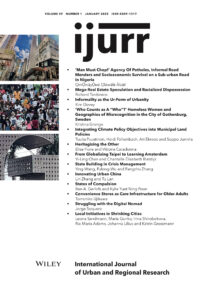Owing to Nigeria’s poor road maintenance culture, informal road menders (IRMs) have emerged who fill potholes on urban and sub-urban roads in exchange for money from road users. This article interrogates the micropolitics of this phenomenon as a relatively new means of informal livelihood within the context of the ethnography of road infrastructure, informal agency and the everyday struggle for socioeconomic survival. Conceiving informal road mending as a livelihood offers a promising lens for discussing how IRMs gain and retain access to space, navigate risks, and harness relationships with other road users and state institutions along the road. Drawing on conversations with drivers and commuters during ‘go-alongs’ in public transport and on interviews with IRMs, private car owners and state regulatory agents, the article shows how IRMs and other road users appropriate the risks and opportunities associated with potholes as socioeconomic resources through which they leverage the precarious road transport experience in the country. This contributes to the literature on the ethnography of road infrastructures and the micropolitics of informal work in urban Africa.
Details
Written by:
Ọmọ́máyọ̀wá Ọláwálé Àbàtì
Digital Object Identifier (DOI)
https://doi.org/10.1111/1468-2427.13287
About DOI

